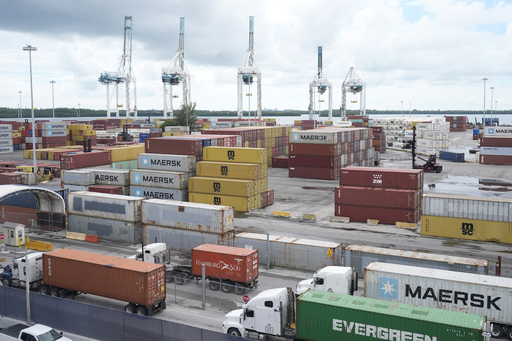Around 45,000 dockworkers at East and Gulf coast ports have ended their strike after a deal was reached by their union to suspend the strike that could have resulted in shortages and higher prices. The International Longshoremen’s Association has decided to suspend the strike until January 15 to allow for further negotiations on a new contract. A tentative agreement on wages has been reached between the union and the U.S. Maritime Alliance, representing ports and shipping companies.
The ports increased their wage offer from around a 50% raise over six years to 62% in the tentative agreement. The agreement will still have to undergo approval by union members as part of the contract ratification process. Discussions will now focus on the automation of ports, which the union believes will lead to a reduction in jobs, among other unresolved issues. The settlement of the strike removes a potential liability for Vice President Kamala Harris and is advantageous for the Biden-Harris administration, which has positioned itself as a union-friendly administration.
Following the strike, it will take some time for the ports to resume operations fully as machinery needs to be restarted and ships waiting at sea need to dock. Despite this, consumers are not expected to face shortages as the strike was relatively short-lived. According to William Brucher from Rutgers University, disruptions are anticipated to be minimal, minimizing the impact on consumers. Supply chain experts suggest that for every day of a port strike, it takes four to six days to recover, requiring about 20 days to return to normal levels.
Initially, the strike began after the union’s contract expired, with disagreements over pay and automation at ports spanning from Maine to Texas. The strike took place during the peak holiday season, but most retailers had already prepared for the potential disruption. The agreement to suspend the strike indicates progress towards a final deal as the two sides work to finalize the language on automation, wages, and other issues.
The union had been requesting a 77% raise over six years and a complete ban on port automation, which they see as a threat to their jobs. The distribution of royalties and pension contributions have also been points of contention. ILA President Harold Daggett has been advocating for a ban on automation at the ports to protect jobs, while shipping companies seek flexibility to automate for competitiveness.
Automation, though concerning for workers, can also lead to job creation as new tasks arise, according to experts. The efforts to find a balance between job security for displaced workers and the creation of new roles are crucial in final negotiations over automation. The involvement of the Biden administration and pressures to settle from various parties played a role in reaching the agreement to suspend the strike.
Overall, the temporary suspension of the strike provides both sides with an opportunity to finalize a new contract before the deadline on January 15. It allows for further discussions on critical issues such as wages, automation, and job security at the ports.


